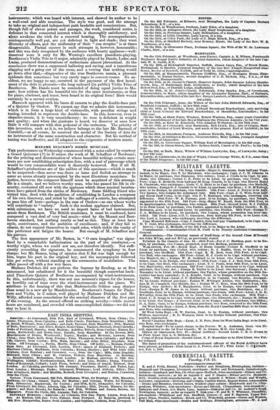MADAME DULCKEN'S sontiz MUSICALE.
THE performance on Wednesday commenced with a noise called by courtesy a Grand Quintuor (?) in D minor, the work of M. Schaffner of Bordeaux; for the printing and dissemination of whose beautiful writings certain ama- teurs are now establishing subscription-list; with a zeal of patronage which would be very commendable were it discreetly bestowed. But if all M. Schaffner's productions are of the calibre of this specimen-which is much to be suspected-then never was there so lame and foolish an attempt to enter an arena already preoccupied by the most illustrious musicians. In justice, however, the composer himself must be acquitted of this attempt. He is a simple, and we believe worthy man, who has passed his life in ob- scurity, contented till now with the applause which these musical lucubra- tions have gained from the circles of Bordeaux. Some fiddling friend who visited him, fired with the ambition of establishing in London a composer of his own discovery, and aided by the suffrages of a coterie, has attempted to pass him off here-perhaps in the rear of Onslow-as one whose works will contribute to "variety." Such is the modest applause claimed. But, with submission, we have no need to import bales of bad instrumental music from Bordeaux. The British musicians, it must be confessed, have composed a vast deal of very bad music-tried by the Mozart and Beet- hoven standard, but nothing nearly so bad as this. They at least have style, contrivance, and the ambition of excellence; and, if they fail to charm, do not expend themselves in vapid solos, which tickle the vanity of the performer and fatigue the hearer. But enough of M. Schaffner and his patrons.
The first appearance of Mr. Beston, in "0 cant imagine," was signa- lized by a remarkable hallucination on the part of the conductor' -a worthy wight, whom we could not see, nor therefore identify. Not suffi- ciently consulting the signature, he commenced the symphony in four sharps; but Mr. Beaton, being of opinion that E flat was high enough for him, began his part in the original key, and the accompanyist followed him per sakunt, without standing on the ceremonies of modulation. The affair passed off with a few wry faces.
Madame Dulcken did not perform the Septuor by Reuling, as at first announced, but substituted for it the beautiful though somewhat back- nied Pianoforte Quintet of Beethoven accompanied by wind-instruments. In this, unfortunately, there was not one moment's repose for the hearer, so horribly out of tune were the wind-instruments and the piano. We attribute to the hearing of this that Mademoiselle Schloss sang sharper than usual in a new air by Mendelasohn. Beethoven's Sonata for Piano- forte and Violin, in C minor, well played by Madame Dulcken and Mr. Willy, afforded some consolation for the musical disasters of the first part of the evening. As the second offered no striking novelty-while mortal hours are numbered, and crowded with unaccomplished duties-we did not stay to hear it.


























 Previous page
Previous page